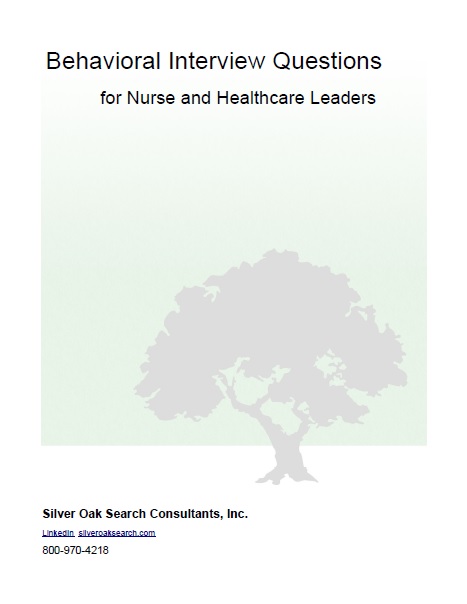This paper provides suggestions for nurse and healthcare leaders who will need to answer healthcare behavioral interview questions in their upcoming job search.
Healthcare interviews make wide use of behavioral interview questions. These questions are designed to gather information about your past accomplishments that is then used to predict your future success.
However, healthcare is undergoing a period of transformational change. With these changes, many new and unanticipated challenges have emerged.
Due to these extensive changes, many healthcare organizations are analyzing how to improve their interview process. This includes enhancing their behavioral interview questions to not only evaluate your accomplishments, but to also gain an even deeper understanding of your leadership skills.
Above all, healthy healthcare organizations need leaders who understand ambiguous situations and display agility when making complex decisions. Often these leaders must deal with extenuating circumstances.
For example, you are a project manager in the midst of a hospital-wide EMR implementation when your CIO resigns. Your successful results include completing your project on time. In addition, having worked in a collaborative manner, you lost no staff, two of your managers were promoted due to their exemplary performance and you won the “Most Successful Project of 2015” award.
Implementing an EMR system is a major accomplishment. In the past, this alone would have been enough to impress your interviewer.
Behavioral Interview Questions
However, today the interviewer wants to understand the manner in which you handle unanticipated challenges. You more effectively illuminate the skills required for future success when you describe extenuating circumstances and discuss your collaborative approach, creativity, agility and ability to adapt rapidly.
Prospective healthcare employers may ask questions such as:
- “Describe the extenuating circumstances under which you were successful.”
- “Describe how agile your decision making is.”
- “Tell me how you addressed unfamiliar challenges in the past.”
- “Provide an example of your use of creative and innovative problem solving.”
- “What non-healthcare methodology or process have you adapted in your organization?”
In other words, “Does this candidate demonstrate skills that indicate an ability to deal with tomorrow’s unforeseen challenges?”
If you are considering a new career opportunity, it is necessary to re-examine the healthcare interview questions, especially the behavioral questions, your prospective employer will ask.
Skills for Transformational Change
Today’s behavioral interview responses are evaluated to identify leaders who are:
- Collaborative and empower their staff,
- Visionary and proactive,
- Transparent,
- Embracing evidence-based practice,
- Positive, engaged, passionate and creative,
- Strategic and critical thinkers,
- Empathic and compassionate,
- Innovative,
- Motivational,
- Able to influence and encourage their staff to challenge “but we’ve always done it this way”, and
- Embracing Lean and Six Sigma processes.
The better you help your potential employer understand your leadership skills, measurable and quantifiable accomplishments, the extenuating circumstances under which you achieved them and your ability to adapt rapidly and proactively to unforeseen challenges, the better your chances are of being hired.
To conclude, today’s healthcare behavioral interview requires that you do more than relate to a prospective employer what you did in the past. You must help the interviewer understand the circumstances and ambiguity in which you worked and the barriers you had to overcome.
This a short excerpt from the 19 page paper Behavioral Interview Questions
Get Your Copy by Email Now
(We will never sell, give away or spam you.)

